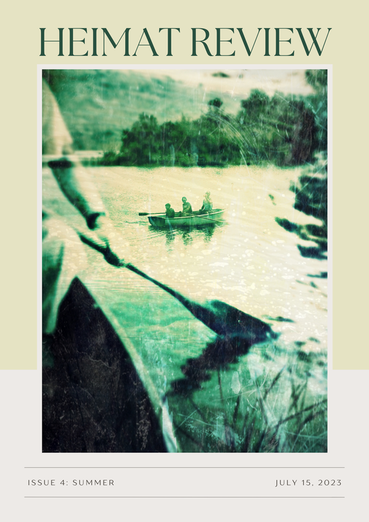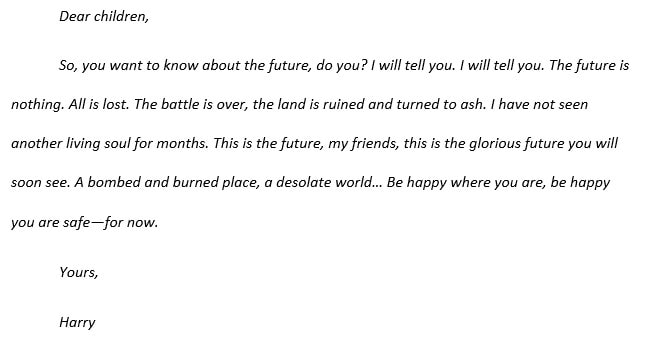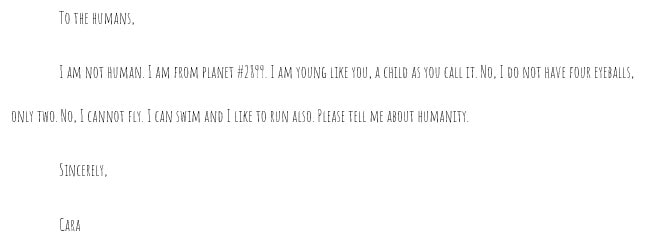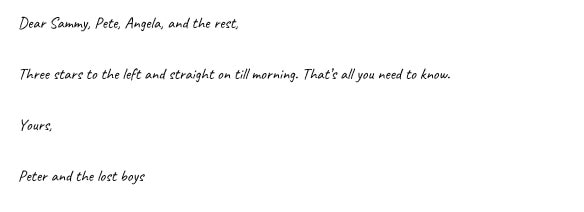The Mailbox
By Chaya Friedman
July 15, 2023
July 15, 2023
The mailbox came one day in early June. It was nailed firmly to the ground and it was shiny and brand new and smelled like cold metal. Its mouth was wide and gaping waiting for the mail to pass through it. They piled cement on its four legs and it stood there firmly, secure, permanent. The mailbox was empty and fresh and the neighborhood children took to it at once. They scribbled on its smooth blue surface, kicked it, touched it, and passed a hand across it for luck every time they walked by. They dared one another to kiss it and softly pressed their lips to its harsh, stern countenance. They greeted it as one might greet a friend with hearty hellos and slaps.
It was humid and the stars were out that night when Sammy thought of the letters. Sammy was small and thin and pale. He had thick dark hair and blazing dark eyes and he was wild in his own strange way. The other children liked him, they liked little Sammy with his strange ideas.
“Why don’t we send a letter?” Sammy asked the rest of them. It was hot out and the children were all in shorts and beat-up sneakers.
“A letter?”
“Sure, a letter. That’s what a mailbox is for, isn’t it?”
They looked at one another and then back at Sammy, consternation changing to comprehension and then finally their faces lighting up as it dawned on them. Their excitement filled them and made them wild. They raced up the streets feeling the damp air caress their faces, feeling the ground hard beneath their torn sneakers. They squealed and leaped with eagerness. The stars lit up that brilliant night and the trees made ghostly shadows. One after the other sweaty hands and legs pushing and shoving they hurried into the basement of Mr. Barry’s dollar store.
“Who should we write it to?”
“Write it to my cousin in Chicago.”
“Write it to Mrs. Peddly.”
The children sat in a circle their heads bent together little thin streams of laughter and talk filling the air. Sammy stood up suddenly, his eyes raging with some otherworldly fire.
“I know who to write it for,” he said. “Sure, I know. We should write it to somebody in the future.”
“The future…” the children whispered and stirred and their eyes caught some of that fire that shone in Sammy’s own. They began to write with many sighs and grim faces and pencil shavings. Soon, the letter was enveloped and carefully addressed. “To the future,” they said softly to one another.
The mailbox was waiting in the pale starlight, slack-jawed. A trembling hand dropped the letter inside its gaping mouth and the mailbox swallowed and sent it on its long journey of time and minutes and years.
And so, the children waited. They did all the things children must do, and they waited. They made their beds and drank up their medicine. They were polite to grandmothers and wore uncomfortable clothes and picked at scabs. They felt the summer heat on their backs and biked with the burning metal handlebars blistering their hands. They felt ice cream dripping down their chins and they jumped in puddles. And they waited all the time.
It was Sammy who received the letter. It was Sammy who gave the sudden cry and knocked over his orange juice. It was Sammy who tore open the stiff and time-worn envelope.
It was humid and the stars were out that night when Sammy thought of the letters. Sammy was small and thin and pale. He had thick dark hair and blazing dark eyes and he was wild in his own strange way. The other children liked him, they liked little Sammy with his strange ideas.
“Why don’t we send a letter?” Sammy asked the rest of them. It was hot out and the children were all in shorts and beat-up sneakers.
“A letter?”
“Sure, a letter. That’s what a mailbox is for, isn’t it?”
They looked at one another and then back at Sammy, consternation changing to comprehension and then finally their faces lighting up as it dawned on them. Their excitement filled them and made them wild. They raced up the streets feeling the damp air caress their faces, feeling the ground hard beneath their torn sneakers. They squealed and leaped with eagerness. The stars lit up that brilliant night and the trees made ghostly shadows. One after the other sweaty hands and legs pushing and shoving they hurried into the basement of Mr. Barry’s dollar store.
“Who should we write it to?”
“Write it to my cousin in Chicago.”
“Write it to Mrs. Peddly.”
The children sat in a circle their heads bent together little thin streams of laughter and talk filling the air. Sammy stood up suddenly, his eyes raging with some otherworldly fire.
“I know who to write it for,” he said. “Sure, I know. We should write it to somebody in the future.”
“The future…” the children whispered and stirred and their eyes caught some of that fire that shone in Sammy’s own. They began to write with many sighs and grim faces and pencil shavings. Soon, the letter was enveloped and carefully addressed. “To the future,” they said softly to one another.
The mailbox was waiting in the pale starlight, slack-jawed. A trembling hand dropped the letter inside its gaping mouth and the mailbox swallowed and sent it on its long journey of time and minutes and years.
And so, the children waited. They did all the things children must do, and they waited. They made their beds and drank up their medicine. They were polite to grandmothers and wore uncomfortable clothes and picked at scabs. They felt the summer heat on their backs and biked with the burning metal handlebars blistering their hands. They felt ice cream dripping down their chins and they jumped in puddles. And they waited all the time.
It was Sammy who received the letter. It was Sammy who gave the sudden cry and knocked over his orange juice. It was Sammy who tore open the stiff and time-worn envelope.
It was Sammy who puzzled over the words first. And it was Sammy who shouted “lookie what I got here, look what I got!” and set the children running. They grabbed it from him eagerly and with careful, painstaking, stuttering, read out the letter.
“Hey Sammy, you know what this means?” they asked.
“No, not any more’n you do,” Sammy replied.
They moaned and glared and squinted but the inky words would not reform. They made nothing of it. The letter was tossed into a drawer in Sammy’s bedroom, to be discovered years later by an older Sammy, one who would turn a deathly white and try to remember where it had come from…
After that, the children began to send more and more letters. There was one sent to Mars and one to the moon. There was one sent to Neverland and a few more to that perilous place called the future. Letters to the center of the earth and then to the swashbuckling pirates of eighteen forty-two. The mailbox was sending all sorts of things, locks of hair and tubes of toothpaste, Martian cacti, and dog treats. shoelaces and dolls, lipsticks stolen from mothers drawers…
“Hey Sammy, you know what this means?” they asked.
“No, not any more’n you do,” Sammy replied.
They moaned and glared and squinted but the inky words would not reform. They made nothing of it. The letter was tossed into a drawer in Sammy’s bedroom, to be discovered years later by an older Sammy, one who would turn a deathly white and try to remember where it had come from…
After that, the children began to send more and more letters. There was one sent to Mars and one to the moon. There was one sent to Neverland and a few more to that perilous place called the future. Letters to the center of the earth and then to the swashbuckling pirates of eighteen forty-two. The mailbox was sending all sorts of things, locks of hair and tubes of toothpaste, Martian cacti, and dog treats. shoelaces and dolls, lipsticks stolen from mothers drawers…
The letters went on and on, to and fro, back and forth. The children lived a thousand lives, had a thousand adventures, and saw a thousand mountains and valleys and rivers and oceans through them. The mailbox became battered and hunched, beaten and old, bent and tired. The letters slid in and out of the mailbox and the summer was coming to a close and the mailbox was tired. The summer was coming to a close, and the children were feeling drowsy and upset, and anxious. The summer was coming to a close, and Sammy hunched his thin shoulders against the onslaught of school and homework and teachers and the winter cold. The summer was coming to a swift and ugly close, the closing of a golden chapter, and the shutting of a golden gate.
And then the mailbox was gone. It was gone, leaving only the lumps of hard cement and a cool dark shadow behind. It was gone, leaving a pale memory, an elusive glimpse of what had passed in and out of it. it was gone, wrenched from its place, splintering, shattering, it was taken away and melted down.
Sammy’s face shuddered and trembled when he told the others. “It’s gone,” he said limply. “The mailbox is gone.” He could not help a single tear from slipping from his fiery eyes.
“Don’t be a baby Sammy,” the others said. “It was only a game.”
“Sure, I know. It was only a game.”
And they forgot all about it.
And then the mailbox was gone. It was gone, leaving only the lumps of hard cement and a cool dark shadow behind. It was gone, leaving a pale memory, an elusive glimpse of what had passed in and out of it. it was gone, wrenched from its place, splintering, shattering, it was taken away and melted down.
Sammy’s face shuddered and trembled when he told the others. “It’s gone,” he said limply. “The mailbox is gone.” He could not help a single tear from slipping from his fiery eyes.
“Don’t be a baby Sammy,” the others said. “It was only a game.”
“Sure, I know. It was only a game.”
And they forgot all about it.
Chaya Friedman is a Brooklyn-based writer who likes rainy days.




